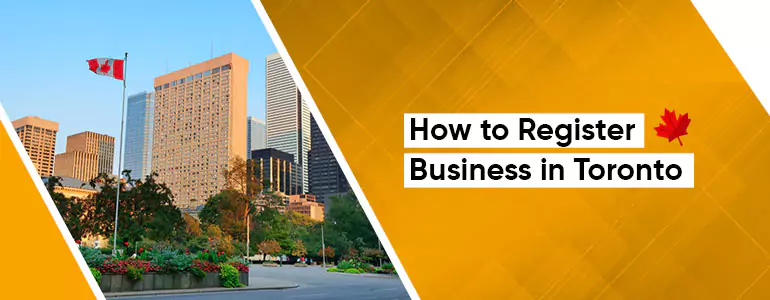Thinking of launching a new business in Toronto? That’s an exciting step, but success does not happen by accident. Whether you are planning a cafe or a tech startup, there are some steps that you need to take.
If you are short on time, follow these 9 essential steps to get your business registered in Toronto:
- Choose a Business Structure
- Name Your Business
- Register the Business Name
- Get a Business Number (BN)
- Apply for Required Licences and Permits
- Open a Business Bank Account
- Set Up Accounting & Record Keeping
- Register for HST (if applicable)
- Understand Zoning and Location Rules
Why Start a Business in Toronto?
Toronto is Canada’s largest city and a major economic hub, contributing over $400 billion to the national GDP (source: City of Toronto Economic Development). It is home to more than 95,000 active businesses and hosts a wide range of sectors, including finance, construction, hospitality, and professional services.
With access to a skilled labor force, reliable infrastructure, and a well-regulated business environment, Toronto provides a practical and strategic location to launch your venture.
If you’re planning to start your own business, this guide outlines how to register a business in Toronto in 9 clear steps, from name registration to obtaining licenses and permits.
Register Business in Toronto (9 Steps)

1: Conduct Market Research
Before you invest time or money, it’s critical to understand your potential customers and the demand for your product or service.
Why Market Research Matters
You might think your idea is amazing, but what matters most is what the market thinks. Market research helps answer key questions like:
- Who are your potential clients?
- Are they genuinely interested in what you offer?
- What are they willing to pay?
- Who is most likely to purchase?
- What market trends should you be aware of?
- Is there enough long-term demand to keep your business running?
Two Types of Market Research
- Primary Research
Gather new data directly through:- Surveys
- Interviews
- Observation
- Opinion polls
- Secondary Research
Analyze existing data from reputable sources like:- Government reports
- Academic studies
- Industry publications
Helpful Tools & Resources (Toronto-Based)
Here are some excellent places to begin your research:
- Toronto Neighbourhood & Community Profiles for local demographic insights
- Toronto’s Economy, Labour Force & Demographics for economic data
- Census data for Population and Dwelling Counts
- Industry Trends (Gov. of Canada) for emerging trends across sectors
- Canadian Importers Database is useful for supply chain and competitor analysis
2: Prepare a Business Plan
Once you understand your market, it’s time to put your vision on paper. A business plan is your roadmap, showing where your business is going and how you’ll get there.
What to Include in Your Business Plan
- Executive summary
- Company description
- Market analysis (based on your research)
- Organizational structure
- Product or service offering
- Marketing & sales strategy
- Financial projections
- Funding request (if applicable)
Need Help? You’re Not Alone!
Toronto’s Small Business Enterprise Centre offers free business plan reviews and consultation services. Once your plan is ready, you can book a one-on-one meeting with an advisor to refine your strategy.
3: Create a Marketing Plan
A great product or service isn’t enough, your business needs visibility. A marketing plan outlines how you’ll promote your offerings and reach the right customers.
What to Include in Your Marketing Plan
Executive Summary
A quick overview of your entire marketing plan. Even though it’s written last, it appears at the front. Keep it short, punchy, and informative.
Market Research
Build on your earlier research. Focus on:
- Market trends (e.g., seasonal patterns)
- Target audience demographics and buying behavior
- Competitors and what they offer
- Sales benchmarks in your industry
- Supplier relationships
Target Market
Who exactly is your product or service for? Define your niche clearly.
Product Description
Describe what you’re selling and how it solves a problem or meets a need in the market.
Competition & USP
Who are your competitors? What’s your Unique Selling Proposition (USP)? Why should customers choose you?
Mission Statement
Define your purpose: who you’re serving, what you’re offering, and what makes your business distinct.
Marketing Strategies
Use a mix of online and offline approaches:
- Networking
- Flyers and brochures
- Print advertising
- Social media and websites
- Trade shows
- PR and media
- Email and direct marketing
- Speaking engagements and blogging
Pricing, Positioning & Branding
Establish how your product is priced and positioned in the market. Think about brand identity — visuals, voice, and values.
Budget
Plan your spending: what’s affordable, what’s DIY, and what needs outsourcing?
Measurable Marketing Goals
Set specific, number-based goals like:
- “Gain 30 new clients in 3 months”
- “Increase web traffic by 50% in 6 months”
- “Reach $10,000 in monthly sales by year-end”
4: Choose a Business Structure
Your business structure affects your taxes, liability, and legal obligations. In Ontario, you have three main types of business structures in Canada:
Sole Proprietorship
- Easiest and least expensive to set u
- You’re personally liable for business debts
Partnership (General or Limited)
- Two or more owners
- Profits and responsibilities are shared
Corporation (Provincial or Federal)
- A separate legal entity
- Limited liability protection
- More complex to register and maintain
Each structure has pros and cons, it’s worth speaking to a legal or financial advisor before making a choice.
5: Register Your Business
If you’re not operating under your name, you must register your business name in Toronto.
Where to Register
- Business Registry (online portal)
- In-person at the Small Business Enterprise Centre
Types of Registration
Sole Proprietorships & Partnerships
- Valid for 5 years
- Must be renewed before expiry
Incorporation
Provincial Incorporation:
- Requires a NUANS name search (unless you’re using a numbered name)
- Incorporation must occur within 90 days of the name search
Federal Incorporation:
- Gives name rights across Canada
- You must register in each province where you do business
- NUANS search is included
Not-for-Profit Incorporation
- Requires at least 3 directors
- Also needs a NUANS name search if using a specific name
- Can register for a charitable number for tax exemption and donation receipts
6: Secure Your Financing
No matter how strong your business idea is, it needs capital to take off. Financing can come from traditional banks, private lenders, or government-supported funding programs. The right source depends on what stage your business is in and what the funds will be used for.
Start by asking yourself:
- Where am I in the business growth cycle?
- What do I need funding for: development, growth, expansion?
- What financing options are already available to me?
If you’re in the early stages and working with just an idea or a prototype, your best bet may be seed funding, typically from personal savings. As you start building traction, maybe you have a few paying customers or a completed business plan, you might consider asking family or friends for startup financing.
Businesses that are showing real market interest and need capital to scale might benefit from angel investors or venture capital. Once you’re generating steady revenue and need funds to grow operations, growth capital or even traditional loans from banks could be appropriate.
If your business is more mature and you’re looking at expansion, IPO preparation, or carrying significant debt, mezzanine or bridge financing might be what you need. For innovative projects seeking public interest and small investments from many people, crowdfunding is also a viable alternative.
To explore your options, visit Funding for Small Business for programs tailored to different business stages and sectors.
7: Choose Your Business Location
Location isn’t just about foot traffic, it’s also about zoning. Before you sign a lease or buy property, make sure the type of business you want to run is allowed at that location.
Zoning regulations differ depending on the type of activity, and the City of Toronto enforces these rules strictly. For details, visit your nearest Toronto Building Customer Service counter. If you plan to build or renovate, you may also need a building permit, which can be obtained through the City of Toronto.
Careful location planning now can save you from costly headaches later.
8: Apply for a Business License
Depending on what kind of business you’re opening, you may need a license to operate legally in Toronto.
Start with BizPaL, an online tool that helps you identify which municipal, provincial, and federal licenses you need based on your business type and location.
In the City of Toronto, many common businesses, such as food services, salons, and transportation services, require municipal licenses issued by the Municipal Licensing and Standards Division. If you’re operating outside Toronto, licensing requirements may vary by municipality.
At the provincial level, certain industries like real estate, motor vehicles, child care, or alcohol sales require special licenses under Ontario’s Business Practices Act.
A small number of businesses also need federal licenses, especially those in highly regulated industries like broadcasting or banking.
9: Determine Tax Requirements
When starting a business in Canada, you’ll need to understand your tax obligations, and the Canada Revenue Agency (CRA) is your main point of contact.
The CRA issues a Business Number (BN), which links your business to several key accounts:
- HST (Harmonized Sales Tax): If your annual sales exceed $30,000, you must register and collect HST. Below that threshold, registration is optional.
- Importer/Exporter Account: Required if you plan to bring goods into or out of Canada.
- Corporate Income Tax Account: Automatically assigned when you incorporate your business.
- Payroll Deductions: If you hire employees, you’ll need to handle income tax, Canada Pension Plan (CPP), and Employment Insurance (EI) deductions.
You can apply for your BN and manage your tax obligations directly through the CRA’s website, which also offers a wide range of resources for business owners.
Other Key Considerations While Registering a Business in Toronto
You’ve tackled everything from planning to financing and licensing. But there are still critical details to consider if you want your business to operate safely, legally, and efficiently in Ontario. From hiring employees to managing privacy and compliance, here are the final steps you shouldn’t overlook.
If You Have Employees
Hiring even one employee means you must comply with several workplace regulations. Ontario’s Employment Standards Act, Occupational Health and Safety Act, and Pay Equity Act (for businesses with more than ten employees) outline what’s required regarding wages, working hours, leave entitlements, and more.
You’re also responsible for registering with the Workplace Safety and Insurance Board (WSIB) within ten days of hiring staff. WSIB provides no-fault insurance coverage for workers in case of injury or illness on the job.
Additionally, employers must account for payroll taxes such as the Employee Health Tax (EHT) and be aware of the Ontario Health Premium, which is deducted from employees’ pay as part of personal income tax.
Importing & Exporting Goods
Planning to import or export? You’ll need to register for an importer/exporter number, which is required for Canadian individuals, businesses, and foreign-based operators alike.
Before trading internationally, be sure to understand the regulatory environment. Global Affairs Canada oversees the Export and Import Permits Act, providing permits and market access guidance. For details on tariffs, duties, quotas, and restricted goods, consult the Canada Border Services Agency (CBSA).
Businesses in the food and agriculture sector must also deal with the National Import Service Centre (NISC), operated by the Canadian Food Inspection Agency, which coordinates inspections and documentation.
If you’re expanding globally, the Canadian Trade Commissioner Service offers expert advice on navigating foreign markets. You might also explore services from Export Development Canada (EDC) for trade financing and risk management.
For tech-driven or high-volume importing, the Electronic Data Interchange (EDI) system through CBSA helps streamline cargo and customs reporting.
Health, Safety & Emergency Preparedness
Workplace safety is about more than compliance; it’s about building a resilient business. Ontario’s Occupational Health and Safety Act (OHSA) places responsibility for preparedness on both employers and employees. This includes planning for emergencies like floods, fires, or utility outages.
If your business involves food or public health services, inspections and compliance with Toronto Public Health and the Ministry of Health regulations are mandatory.
Intellectual Property
Intellectual property (IP) can be one of your business’s most valuable assets. Whether it’s a product, logo, original content, or innovation, protecting your work through trademarks, patents, copyrights, or industrial designs is essential.
The Canadian Intellectual Property Office provides tools and support for registering and managing IP, helping business owners understand how to protect their brand and assets effectively.
Accessibility Compliance
Ontario is working toward a barrier-free province, and your business plays a role. Ontario Accessibility Laws require that all businesses make their spaces and services accessible to people with disabilities. This includes communication, customer service, technology, and physical environments.
Staying informed about your obligations under the Accessibility for Ontarians with Disabilities Act (AODA) is key to being inclusive and avoiding penalties.
Privacy & Data Protection
Collecting customer or employee information? Then your business must comply with privacy legislation in Canada.
The Personal Information Protection and Electronic Documents Act (PIPEDA) governs how private sector organizations gather, use, and disclose personal data. Whether you’re in retail, publishing, services, or another industry, you’ll need to:
- Obtain consent when collecting data
- Use it only for stated purposes
- Secure it properly and limit retention
In Ontario, additional legislation includes FIPPA, MFIPPA, and PHIPA. If you send marketing emails or texts, you’ll also need to comply with Canada’s Anti-Spam Legislation (CASL).
Business Insurance
Insurance is one of the smartest investments you can make. Even if you’re operating a home-based sole proprietorship, basic property and liability coverage can help protect against unexpected risks.
Speak with an insurance broker to evaluate what’s needed, whether it’s commercial liability, equipment, business interruption, or cyber liability insurance.
Final Thoughts
Building a business isn’t just about launching; it’s about sustaining, protecting, and growing it responsibly. From hiring staff to handling personal data, you’ll face ongoing responsibilities, but with the right preparation, your foundation will be strong.
Need help figuring out how to register your business in Toronto? Reach out to experts at Bestax, let’s take your business idea from concept to reality.
Quick FAQs
Q: How do I register a business in Toronto, step by step?
Choose a business structure, do a name search if needed, then register online through the Ontario Business Registry.
Q: Where can I register my business in Toronto?
You can register online via the Ontario Business Registry or in person at the Small Business Enterprise Centre.
Q: How much does it cost to register a business in Toronto?
Registration fees typically range from $60 to $300, depending on the type of business and service provider.
Q: Do I need a license to start a business in Toronto?
Yes, many businesses require municipal, provincial, or federal licenses depending on the business type.
Q: Should I register as a sole proprietor or incorporate in Ontario?
Sole proprietorship is simpler and cheaper; incorporation offers liability protection and tax benefits for larger or growing businesses.
Q: How long does it take to register a business in Toronto?
Online registration can be completed within a few hours to a few days, depending on name approval and application type.
Q: Can I register a business in Toronto as a non-resident or foreigner?
Yes, non-residents can register a business in Ontario, though additional requirements may apply for incorporation or licensing.
Disclaimer: The information provided in this blog is for general informational purposes only. For professional assistance and advice, please contact experts.




